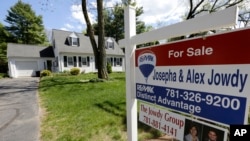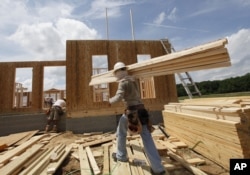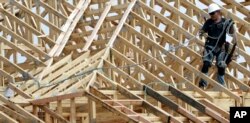America is changing the way it lives. Owning one's home has always been considered a significant part of the modern American dream — it meant pride and security, control, stability and goodbye to landlords.
It still does, but times change and there are signs that the dream of owning a home may be changing as well.
The ‘bubble’
The Great Recession, which began in late 2007 and lasted for nearly two years, is still having an impact on the U.S. housing market. Since the bottom dropped out a decade ago, "new home starts" — used to describe when construction begins on a new home — have been sluggish.
That was until October, when they hit a nine-year high, then dropped in November, suggesting Americans are confused about where and how they want to live.
Some of the confusion stems from memories of the housing market "bubble" of easy money and credit that burst in December 2007 and was a main cause of the Great Recession. More than 20 million foreclosures were filed during the decade. RealtyTrac Data indicates 7.3 million consumers lost their homes between 2007 and 2014.
"Housing was a great part of the recession," said housing expert and New York University professor Lawrence White. "Housing prices fell dramatically from their peak in 2006. Nationwide, the average value of a home dropped 30 to 35 percent. We certainly learned in the recession, investing in a house is not a sure-fire way to build wealth."
However, White says, housing plays a major role in the economic health of the nation.
But for potential homebuyers, it has become a lot harder to get the credit necessary to buy a house. Plus, there's more paperwork when consumers do qualify.
That leads to a depressed market. Another issue: a lack of inventory, says Pamela Woodward, who owns three real estate offices in New Jersey.
"The political climate, at least for now, has people skittish and nervous about the economy," she said.
On the plus side, Fannie Mae and Freddie Mac — two government-backed mortgage companies — are raising the amount of money they will guarantee, for the first time since 2006. That will make it easier for buyers to qualify for larger loans, and to get more home for their money.
Diploma vs. mortgage
Lurking in the background of less new construction is the renting vs. buying issue.
Ingo Winzer, CEO of Local Market Monitor, covers 330 local real estate markets across the United States and forecasts home prices in those areas. Winzer says renting is becoming increasingly attractive because many people just don't have the money to buy.
"There's not enough income to allow people to get into housing," he said.
Seattle-based Zillow is an online real estate database and marketplace company that works with Realtors and consumers to evaluate local property markets. Zillow predicts that millennials will eventually be in a financial position to buy, and will boost home ownership. At the same time, Zillow says, renting will become more affordable as incomes rise and growth in rents slows.
One of the biggest reasons that young Americans are waiting to buy their first home is student debt. Millennials, who used to be considered the prime homebuying age, are carrying an estimated $1 trillion in student loan, according to the U.S government.
Case in point: Kevin Clancy, 47, a Realtor in Albany, New York, says his business is good. "But," he said, "the problem is, the kids are coming out of school with a tremendous amount of student loan debt. It's like a drag on their finances. I have a girl in my office, she's 38. She's still paying $800 a month on student loans. That's money that could be going toward the mortgage. I think it's kind of delaying the process."
Clancy says his view of the under-35 generation is that "they're buying nice cars, they're going out to dinner, and they're staying in apartments. And they're moving around a lot more with their jobs. They are a lot more mobile."
Olga Hannout, a ReMax agent in Manalapan, New Jersey, says she's never seen rentals so high in her 20-plus years in the business. She says she worries the recovery that the United States is enjoying may be artificial, and that's one reason rentals are high.
A cautious market
Ten years ago, the national percentage of households renting was about 30 percent; today, it's about 37 percent, according to the public data website departmentofnumbers.com. Each percentage point nationally is about 1 million households.
Rentals are also attractive because renters are spared the worry of potentially plummeting home values.
"We ought to be making rental housing much more respectable, whether in urban or suburban areas,” White said. “Our whole society ought to get away from the fixation of ownership as the only way to go. It's not the only way to go. Ownership is not for everybody; it takes a certain income, budgetary discipline and a steady income."
Many Americans learned from the recession that investing in home ownership is not a sure way to build wealth, he says.
Currently, however, home values are on the rise. Zillow, utilizing a survey of more than 100 economic and housing experts, forecasts home values increasing by 3.6 percent this year. Last year saw an increase of close to 5 percent.
America in the middle
Other countries are doing as well as or better than the U.S.
"Internationally, we are sort of in the middle of the pack amongst developed countries,” White said. “In terms of things like percentage of households that own their own homes [and] the interest rate mortgage borrowers pay, the U.S. is in the middle of the pack. We were not the only ones to go through a housing bust."
Winzer, of Local Market Monitor, keeps track of local real estate markets in the United States.
"The idea used to be that people with a modest education could have fairly well-paid jobs, like 50 years ago, but that's not the case anymore," Winzer said. "Jobs that were done by skilled labor are done by skilled robots. I think there are some long-term difficulties. I think the idea that the economy is going to be fantastic again is wishful thinking."
Currently, employment is at record levels in the U.S. The incoming Trump administration promises more jobs and, if that happens, it is expected that the government and the banks will provide more incentives to stimulate homebuying.
Bouncing back
The American dream may be hard to recapture, but analysts believe many of those who lost homes in the Great Recession may be ready to give it another try.
Realtor Woodward said she saw two pairs of such boomerang, or rebound, buyers this month.
Both couples "strongly believe in the concept of home ownership," she said.
For them, the American dream lives on.






